CORPORATE ACTION: Clorox
Glad Products, Clorox Face Deceptive Recycling-Related Marketing Lawsuit
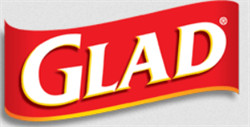 The Glad Products Co. and parent company, Clorox, are facing a false advertising and deceptive marketing lawsuit in US District Court for the Northern District of California. San Francisco resident Patrick Peterson filed the lawsuit claiming the recycling-related marketing claims for the company’s Glad recycling bags are deceptive and violate California and US laws. The company has claimed the lawsuit has not merit. Reynolds Consumer Products has also faced similar lawsuits, including one filed by the Connecticut attorney general in June 2022.[Image Credit: © The Glad Products Company]
The Glad Products Co. and parent company, Clorox, are facing a false advertising and deceptive marketing lawsuit in US District Court for the Northern District of California. San Francisco resident Patrick Peterson filed the lawsuit claiming the recycling-related marketing claims for the company’s Glad recycling bags are deceptive and violate California and US laws. The company has claimed the lawsuit has not merit. Reynolds Consumer Products has also faced similar lawsuits, including one filed by the Connecticut attorney general in June 2022.[Image Credit: © The Glad Products Company]
CORPORATE ACTION: Colgate
Activist Investor Withdraws Planned Shareholder Proposal Following Colgate-Palmolive’s Plastics Pledge
 Colgate-Palmolive announced a plan to expand its efforts to reduce plastic packaging and widen its “reuse models”. In return, Green Century Capital Management withdrew its shareholder proposal, calling for cuts in use of plastic in packaging, for the company’s 2023 annual meeting. In addition, the company promised to expand disclosure in future sustainability reports of reuse pilots, publish a “reuse and refill baseline assessment” as part of its 2023 sustainability report, and speed up target-setting for 2030 plastic reduction efforts.[Image Credit: © Colgate-Palmolive Company]
Colgate-Palmolive announced a plan to expand its efforts to reduce plastic packaging and widen its “reuse models”. In return, Green Century Capital Management withdrew its shareholder proposal, calling for cuts in use of plastic in packaging, for the company’s 2023 annual meeting. In addition, the company promised to expand disclosure in future sustainability reports of reuse pilots, publish a “reuse and refill baseline assessment” as part of its 2023 sustainability report, and speed up target-setting for 2030 plastic reduction efforts.[Image Credit: © Colgate-Palmolive Company]
CORPORATE ACTION: PepsiCo
PepsiCo Aims For 100% Earth-Friendly Packaging For Its Snacks
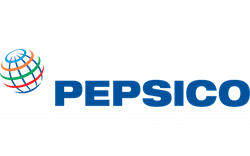 PepsiCo is working to develop 100 percent recyclable, compostable, biodegradable or reusable packaging for its Frito-Lay and Quaker Oats snacks products by 2025. In April 2023, Frito-Lay and Quaker Oats opened a center for packaging innovation aimed at testing compostable materials. PepsiCo and other large consumer products companies have been pressured by activist investors and shareholders into adopting and implementing sustainable practices.[Image Credit: © PepsiCo]
PepsiCo is working to develop 100 percent recyclable, compostable, biodegradable or reusable packaging for its Frito-Lay and Quaker Oats snacks products by 2025. In April 2023, Frito-Lay and Quaker Oats opened a center for packaging innovation aimed at testing compostable materials. PepsiCo and other large consumer products companies have been pressured by activist investors and shareholders into adopting and implementing sustainable practices.[Image Credit: © PepsiCo]
PepsiCo Launches Pep+ Partners For Tomorrow Consumer Sustainability Platform
 PepsiCo has launched its pep+ Partners for Tomorrow platform designed to help consumers realize their sustainability objectives. The program is currently aimed at US customers; however, the company plans to launch it in major markets worldwide by 2024. Some of the platform’s programs include CIRQU, an on-demand collection of recyclable beverage containers for foodservice and retail customers, and Reusable Cup Solutions.[Image Credit: © PepsiCo, Inc./PRNewswire]
PepsiCo has launched its pep+ Partners for Tomorrow platform designed to help consumers realize their sustainability objectives. The program is currently aimed at US customers; however, the company plans to launch it in major markets worldwide by 2024. Some of the platform’s programs include CIRQU, an on-demand collection of recyclable beverage containers for foodservice and retail customers, and Reusable Cup Solutions.[Image Credit: © PepsiCo, Inc./PRNewswire]
CORPORATE ACTION: Procter & Gamble
P&G Packaging Executive Highlights Company’s Efforts To Improve Recyclability Of Packaging
 Procter & Gamble surface care packaging director, Victoria Jung, said her company has put more emphasis on how consumers dispose of their products and packaging. She said they are working to make recycling easier for consumers than it is now and making sure that all components of packaging are simply recyclable. Jung said her company is collaborating with Western Michigan University to ensure that all packaging parts are recyclable.[Image Credit: © Procter & Gamble]
Procter & Gamble surface care packaging director, Victoria Jung, said her company has put more emphasis on how consumers dispose of their products and packaging. She said they are working to make recycling easier for consumers than it is now and making sure that all components of packaging are simply recyclable. Jung said her company is collaborating with Western Michigan University to ensure that all packaging parts are recyclable.[Image Credit: © Procter & Gamble]
CORPORATE ACTION: Unilever
Unilever Nigeria, Bridges Outcomes Partnerships Provide Wecyclers With Long-Term Funding
.png&width=250&height=274)
Unilever Nigeria has joined forces with Bridges Outcomes Partnerships to provide $2 million in funding to social enterprise Wecyclers. The partnership employed a Development Impact Bond, structured by French investment bank Société Générale, to enable Wecyclers to create jobs and expand its efforts to collect and recycle plastic waste. The DIB provides the social enterprise with long-term funding required to expand its sustainability operations and scale up its business model.[Image Credit: © Unilever]
Radox Launches Refillable, Reusable Bottles For Shower Gels
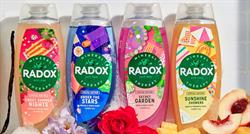
Radox has launched a refillable and reusable bottle for its shower gels. The company said the new bottles are made from 50 percent post-consumer recycled plastic and can be refilled with the company’s recently launched 500ml refill packs. The refill packs use 74 percent less plastic, helping consumers reduce their plastic use.[Image Credit: © Unilever]
CORPORATE ACTION: Other
Arla Foods Works With Südpack To Recycle Plastic Waste Using Pyrolysis
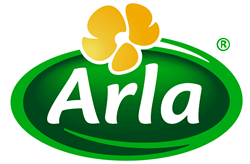 Arla Foods has partnered with Südpack to conduct a large-scale test using pyrolysis to recycle 80 tonnes of plastic waste each year into new packaging. The pyrolysis process changes plastic waste, which Arla Foods had used in its cheese-making operations, into oil using very high temperatures in a controlled environment. If successful, the process would prevent incineration of the plastic waste, keeping it within the loop and recycled.[Image Credit: © Arla Foods amba]
Arla Foods has partnered with Südpack to conduct a large-scale test using pyrolysis to recycle 80 tonnes of plastic waste each year into new packaging. The pyrolysis process changes plastic waste, which Arla Foods had used in its cheese-making operations, into oil using very high temperatures in a controlled environment. If successful, the process would prevent incineration of the plastic waste, keeping it within the loop and recycled.[Image Credit: © Arla Foods amba]
The Friendly Chemical Co. Launches Refill Stations For Miniml Household And Personal Care Products
 The Friendly Chemical Co. has launched a refill station concept for its Miniml brand of ethical household and personal care products. The company partnered with distribution company Acopia and packaging specialist Fenton Packaging Solutions. FCC launched the refill stations at the Air Ambulance Hanger Superstore in Melton Mowbray and the Barnardo’s Superstore in Sutton Coldfield.[Image Credit: © Miniml]
The Friendly Chemical Co. has launched a refill station concept for its Miniml brand of ethical household and personal care products. The company partnered with distribution company Acopia and packaging specialist Fenton Packaging Solutions. FCC launched the refill stations at the Air Ambulance Hanger Superstore in Melton Mowbray and the Barnardo’s Superstore in Sutton Coldfield.[Image Credit: © Miniml]
The Body Shop Launches Refillable Lipstick Collection

The Body Shop launched its Peptalk Lipstick, which is available in a refillable case made from 100% recycled aluminum, in February 2023. The lipstick collection is made with Community Fair Trade Shea Butter and comes in 20 shades, such as nudes, reds, and pinks. The launch expands the beauty retailer’s refill offerings, which include hair care, shower gels and hand soaps.[Image Credit: © The Body Shop/PRNewswire]
CAMPAIGNS, COMMITMENTS & NGOs
EcoDrive Hong Kong Unveils Third Enough Plastic Campaign Focused On Single-Use Plastic Waste

EcoDrive Hong Kong has launched the nonprofit’s third Enough Plastic public awareness campaign in Hong Kong. The campaign aims to raise public awareness about the region’s dependence on single-use plastic and its harmful impact on the environment. First launched in 2019, the campaign features several celebrities, such as Lin Min-Chen, Anson Bean, and Mandy Tam.[Image Credit: © EcoDrive]
CONSUMER & PUBLIC OPINION
Most Americans Support All Kinds Of Plastic Recycling Methods, Survey Reveals

In the United States, 90 percent of respondents said it does not matter what process is used to recycle plastic waste if it prevents plastic pollution. Results of the survey conducted by the Plastics Industry Association also revealed that 87 percent of Americans think industry and government should increase their support for all types of recycling, including advanced recycling. Also, 89 percent of respondents believe a “recycled content” label is appropriate for plastics recycled using mechanical or advanced processes.[Image Credit: © Plastics Industry Association]
Survey Says Failure To Observe Recycling Bin Etiquette Causes Stress For UK Consumers
 In the UK, a recent survey by DS Smith revealed 79 percent of respondents said they are “regularly frustrated, disappointed or furious” with their families, relatives and neighbors because of failure to observe “bin etiquette and un-flattened cardboard”. Details from the survey conducted by the provider of sustainable packaging solutions also showed that more than 7.8 million UK residents said they do not fold cardboard before putting it into recycling bins, while 26 percent said overflowing bins hampered their recycling efforts.[Image Credit: © DS Smith]
In the UK, a recent survey by DS Smith revealed 79 percent of respondents said they are “regularly frustrated, disappointed or furious” with their families, relatives and neighbors because of failure to observe “bin etiquette and un-flattened cardboard”. Details from the survey conducted by the provider of sustainable packaging solutions also showed that more than 7.8 million UK residents said they do not fold cardboard before putting it into recycling bins, while 26 percent said overflowing bins hampered their recycling efforts.[Image Credit: © DS Smith]
Environmentalists Complain About Too Much Focus On Legacy Plastics Cleanup
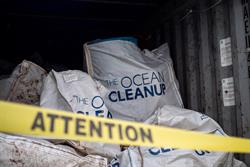 Some environmentalists are claiming that too much emphasis on legacy plastics cleanup, such as the nonprofit group The Ocean Cleanup’s work with the Great Pacific Garbage Patch, is diverting attention from stopping plastic pollution at the source. For example, Environmental Investigation Agency’s Christina Dixon said legacy plastic cleanup is like “putting a band-aid on a broken leg”. Dixon also believes that “getting better at cleaning up the mess” promotes waste and preserves the status quo. Some UN member countries are pushing for inclusion of legacy cleanup provisions in the proposed global plastics treaty.[Image Credit: © The Ocean Cleanup]
Some environmentalists are claiming that too much emphasis on legacy plastics cleanup, such as the nonprofit group The Ocean Cleanup’s work with the Great Pacific Garbage Patch, is diverting attention from stopping plastic pollution at the source. For example, Environmental Investigation Agency’s Christina Dixon said legacy plastic cleanup is like “putting a band-aid on a broken leg”. Dixon also believes that “getting better at cleaning up the mess” promotes waste and preserves the status quo. Some UN member countries are pushing for inclusion of legacy cleanup provisions in the proposed global plastics treaty.[Image Credit: © The Ocean Cleanup]
Survey Shows Almost Half of American Adults Do Not Recycle
 In the US, 43 percent of adults do not recycle, according to a survey of 1,000 adults in March 2023 by Reputation Leaders. Reasons cited by respondents for throwing away things instead of recycling include lack of clarity of recycling packaging, inconvenience, and belief that recycling will not change anything. Reputation Leaders offers the following tips on how to promote recycling: make recycling clearer and more convenient, convince doubters that recycling can make a difference and show that recyclable and reusable products make good sense and good business.[Image Credit: © Reputation Leaders Ltd]
In the US, 43 percent of adults do not recycle, according to a survey of 1,000 adults in March 2023 by Reputation Leaders. Reasons cited by respondents for throwing away things instead of recycling include lack of clarity of recycling packaging, inconvenience, and belief that recycling will not change anything. Reputation Leaders offers the following tips on how to promote recycling: make recycling clearer and more convenient, convince doubters that recycling can make a difference and show that recyclable and reusable products make good sense and good business.[Image Credit: © Reputation Leaders Ltd]
MARKET NEWS
PureCycle Technologies Sees Large Put Option Trade
 An investor bought almost $115,000 block of put contracts in PureCycle Technologies, Inc. on April 4, 2023. Investment analysts forecast an average price of $14.94 for the year as of March 30, 2023, for the recycling technology company. Among its large shareholders, Sylebra Capital, which owns 17.84 percent of the company, did not change the volume of owned shares, while Samlyn Capital, which owns over four percent of the company, decreased its holding by nearly 15 percent.[Image Credit: © PureCycle Technologies, Inc.]
An investor bought almost $115,000 block of put contracts in PureCycle Technologies, Inc. on April 4, 2023. Investment analysts forecast an average price of $14.94 for the year as of March 30, 2023, for the recycling technology company. Among its large shareholders, Sylebra Capital, which owns 17.84 percent of the company, did not change the volume of owned shares, while Samlyn Capital, which owns over four percent of the company, decreased its holding by nearly 15 percent.[Image Credit: © PureCycle Technologies, Inc.]
PACKAGING REDESIGNS
Co-op Uses Polytag’s QR Codes To Enhance Recycling Visibility Of Spring Water Bottles
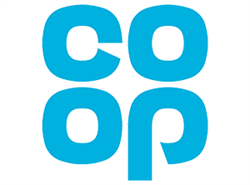
The Co-op will start selling own-label bottled water in PET 2-liter bottles with unique-every-time QR codes and UV tags. Polytag will provide the GS1-compliant QR codes to be used by the UK-based consumer cooperative’s bottled water supplier. Meanwhile, the UV tag layer, invisible to the human eye, is printed by Tipografic with the use of UV flexographic inks.[Image Credit: © Co-operative Group Limited]
Melodea Unveils Sustainable Coating Solution For Food And Non-Food Packaging Applications
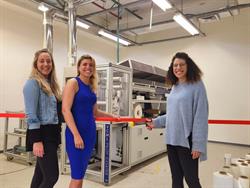
Melodea, Ltd., has launched the VBseal, an environment-friendly coating solution for packaging applications. According to the company, VBseal is resistant to water vapor, oil, and aroma, making it ideal for food packaging. Other applications for the coating solution include packaging of fresh foods, cereals, and fast foods. It is also ideal for packaging of detergents and cosmetics. Melodea has opened a pilot manufacturing facility and technology center to help promote the coating solution.[Image Credit: © PRNewsfoto/Melodea Ltd.]
POLICY, REGULATION & LEGAL
US EPA Releases Draft Plastic Pollution Strategy For Public Comment
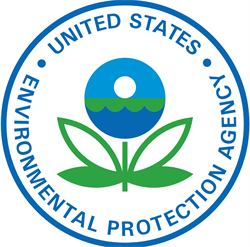 The US Environmental Protection Agency released a draft of the National Strategy to Prevent Plastic Pollution for public comment, marking an important step in the Biden-Harris administration’s efforts to reduce pollution and create a circular economy for all. The release of the draft coincides with the celebration of Earth Week and the launch of the White House Interagency Policy Committee on Plastic Pollution and a Circular Economy. According to the White House, the key objectives of the strategy are reducing pollution during plastic production, improving post-use materials management, preventing trash and micro/nanoplastics from entering waterways and removing escaped trash from the environment.[Image Credit: © US Environmental Protection Agency]
The US Environmental Protection Agency released a draft of the National Strategy to Prevent Plastic Pollution for public comment, marking an important step in the Biden-Harris administration’s efforts to reduce pollution and create a circular economy for all. The release of the draft coincides with the celebration of Earth Week and the launch of the White House Interagency Policy Committee on Plastic Pollution and a Circular Economy. According to the White House, the key objectives of the strategy are reducing pollution during plastic production, improving post-use materials management, preventing trash and micro/nanoplastics from entering waterways and removing escaped trash from the environment.[Image Credit: © US Environmental Protection Agency]
Nonprofit Files Complaint With ACCC Against Ocean Plastic Marketing Claims In Australia
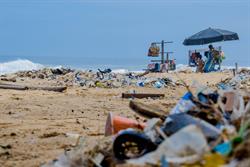 The Tangaroa Blue Foundation has filed a complaint with the Australian Competition and Consumer Commission against manufacturers’ use of the terms “ocean plastics” and “ocean-bound plastics”, claiming these are acts of greenwashing marketing. With the support of lawyers from the Environmental Defenders Office, the nonprofit says ocean or ocean-bound plastics can be collected up to 50 kilometers away from the coast. Also, the group says it is difficult to validate these marketing claims.[Image Credit: © Lucien Wanda from Pexels]
The Tangaroa Blue Foundation has filed a complaint with the Australian Competition and Consumer Commission against manufacturers’ use of the terms “ocean plastics” and “ocean-bound plastics”, claiming these are acts of greenwashing marketing. With the support of lawyers from the Environmental Defenders Office, the nonprofit says ocean or ocean-bound plastics can be collected up to 50 kilometers away from the coast. Also, the group says it is difficult to validate these marketing claims.[Image Credit: © Lucien Wanda from Pexels]
UK Government Plans To Ban Wet Wipes With Plastic In England
.jpg&width=250&height=167) The UK Government plans to implement a ban on wet wipes containing plastic in England after a consultation in 2024. In 2018, the Government first broached the idea of eliminating plastic waste including wet wipes. However, opposition and environmentalists have criticized the proposed ban as weak. Water industry group Water UK, for example, said wet wipes flushed down toilets cause 93 percent of sewer blockages. In Wales, a proposed ban on wet wipes with plastic has not yet been implemented.[Image Credit: © Towfiqu barbhuiya on Unsplash]
The UK Government plans to implement a ban on wet wipes containing plastic in England after a consultation in 2024. In 2018, the Government first broached the idea of eliminating plastic waste including wet wipes. However, opposition and environmentalists have criticized the proposed ban as weak. Water industry group Water UK, for example, said wet wipes flushed down toilets cause 93 percent of sewer blockages. In Wales, a proposed ban on wet wipes with plastic has not yet been implemented.[Image Credit: © Towfiqu barbhuiya on Unsplash]
OTHER NEWS
Report Says UK Recycling System Needs Major Overhaul
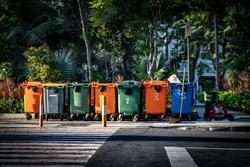 The UK’s recycling system needs a “dramatic overhaul” to address the country’s problem with plastic waste, according to a report by the One Bin to Rule Them All project team at the University of Manchester. The report, “Tackling Household Plastic Waste: Best Practice for a Circular Plastics Economy,” said the country’s “failure to transition to a circular economy” is due to a lack of standards across the plastics supply chain. Also, the report shows that a “lack of consistency” in plastic packaging composition and messaging about recycling practice confuses consumers. The problem is worsened by the “discrepancies in recycling practices” among local authorities.[Image Credit: © Niko Lienata from Pixabay]
The UK’s recycling system needs a “dramatic overhaul” to address the country’s problem with plastic waste, according to a report by the One Bin to Rule Them All project team at the University of Manchester. The report, “Tackling Household Plastic Waste: Best Practice for a Circular Plastics Economy,” said the country’s “failure to transition to a circular economy” is due to a lack of standards across the plastics supply chain. Also, the report shows that a “lack of consistency” in plastic packaging composition and messaging about recycling practice confuses consumers. The problem is worsened by the “discrepancies in recycling practices” among local authorities.[Image Credit: © Niko Lienata from Pixabay]
Copyright 2026 Business360, Inc.

